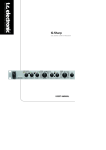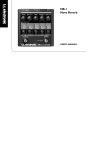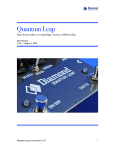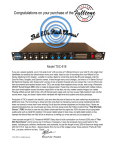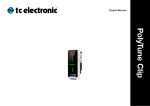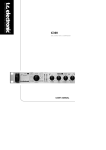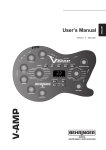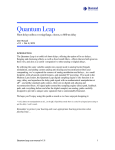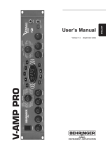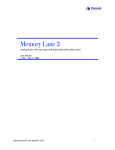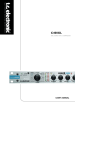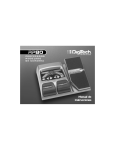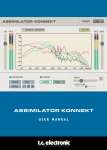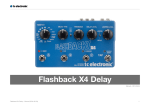Download RPT-1 Nova Repeater Manual
Transcript
RPT-1 NOVA Repeater USER’S MANUAL TABLE OF CONTENTS EN INTRODUCTION Table of Contents . . . . . . . . . . . . . . . . . . . . . . . . . . . .3 Introduction . . . . . . . . . . . . . . . . . . . . . . . . . . . . . . . .4 SETUP EXAMPLES Mono/Stereo . . . . . . . . . . . . . . . . . . . . . . . . . . . . . . . .6 Send/Return . . . . . . . . . . . . . . . . . . . . . . . . . . . . . . . .7 OPERATION Front View . . . . . . . . . . . . . . . . . . . . . . . . . . . . . . . . .8 Connections . . . . . . . . . . . . . . . . . . . . . . . . . . . . . . . .9 Controls . . . . . . . . . . . . . . . . . . . . . . . . . . . . . . . . . . .9 APPENDIX Technical Specifications . . . . . . . . . . . . . . . . . . . . . .15 TC Electronic, Sindalsvej 34, DK-8240 Risskov – [email protected] English Version Manual revision 1.0 – SW – V 1.0 E60515011 3 INTRODUCTION The brand new NOVA Repeater delay pedal NOVA Repeater is our new “no-frills-with-a-sound-thatkills” delay pedal. It’s just the right pedal for you if you are a demanding guitarist who wants instant, high quality and unique results, without any of the fuss! It features the same great sound quality that made our NOVA Delay the first choice delay pedal for Paul Gilbert, Doug Aldrich, Nils Lofgren and Allen Hinds. However, after listening to our guitar-playing community we have trimmed out any excess baggage while including additional features over the NOVA Delay. Finally, we wrapped all this power into a streamlined and very easy to use interface. In short: NOVA Repeater is the essential lean, mean, delaymachine! Simple, yet effective NOVA Repeater is all about simplicity. There are no hidden features or complicated functions – you just get the world’s best delays in an affordable and easy-touse package. Yet it is also feature-rich; being the only pedal in its price range that has a dedicated tap tempo switch and our amazing audio tapping technology that 4 lets you set the tempo with your playing. And with six types of TC-quality delays and an unsurpassed feature set, NOVA Repeater is quite simply a bargain. All new features NOVA Repeater has three delay time ranges labeled for min, mid and max positions. These delay times have been carefully chosen to match the “sweet spot” times used by most guitar players, making it much easier for you to dial in the perfect delay time – even without a display. The NOVA Repeater features two inputs for instrument or line level signals – which means you can use it equally well in front of your amp or in an effects loop. It also has a “KillDry” switch that makes it possible to use the pedal in a parallel effect loop. This is also a great feature for guitar players who use a mixer to prevent their dry sound from being processed. An FX.Level pot lets you adjust the wet level of your signal, which means that you won’t get annoying level drops on your dry sound – a common problem with other pedals. INTRODUCTION The bottom line NOVA Repeater lets you focus on playing and always delivers exactly what you are looking for. Great sound, simple to use and more features than any other pedal at this price – what more could you ask for? Again, following numerous user requests, we added a new dual delay types such as 1/4 and 1/8 notes. This stereo delay is one of the secrets behind Steve Lukather famous 80’s sound – just be sure to set the delay time to exactly 400 ms. NOVA Repeater also features a brand new adaptive dynamic delay that automatically sets the perfect threshold for ducking. No calibration is required – even if you decide to turn up the volume during a solo, NOVA Repeater will automatically adjust the threshold on the fly. 5 EN NOVA Repeater has a new multi-function knob that lets you control the amount of modulation as well as turn the modulation effect on/off. The chorus has been retuned making more dramatic modulation effects possible and, on top of that, a brand new vibrato mode has been added. This was a major request among NOVA Delay users and makes it possible to emulate classic tape delay wow-and-flutter or create lush modulated pads with a volume pedal. SETUP EXAMPLE: MONO/STEREO This setup illustrates how to use NOVA Repeater in a mono setup (one amp only) or in a stereo setup (two amps). Effects such as reverb and delay are usually placed as the last signal processors before the amplifier. Therefore, you should place all drive and modulation effects prior to NOVA Repeater. If you use your amp(s) to create overdrive, see the “SEND/RETURN” example on the following page. 6 This example shows how to connect your NOVA Repeater pedal as a send/return effect in an effects loop. This is the correct approach if you use the pre-amp section of the amp to generate overdrive. You can expand this to a stereo setup by connecting NOVA Repeater’s right output to the return (power-amp in) of a second amp. For parallel effects loops use the killdry function. 7 EN SETUP EXAMPLE: SEND/RETURN OVERVIEW 8 Connections 1 – Power NOVA Repeater requires 9-12V DC 300 mA. We recommend using the supplied 12V power-supply or a power-supply with identical specifications. Please note that NOVA Repeater’s dynamic input range is reduced if only 9V are supplied. This is only an issue if you use a drive or boost pedal prior to NOVA Repeater and crank the output of that pedal hard. 2/3 – HI IN & LO IN – Inputs NOVA Repeater has two input options: LO and HI. Which input to use depends on how “hot” a signal you connect. If the signal has passed a preamp or a hot boost/drive pedal, use HI. Otherwise, use LO. But you can simply try both and let your ears decide. or just one are being used. Use the left output in a mono setup. In this case, the stereo-sensing feature will send delay repeats intended for both outputs to the left output when the right output is left unplugged. Controls 5/10 – DELAY Knob and DELAY RANGE Table The DELAY knob adjusts the delay time. Turn counterclockwise to reduce and clockwise to increase the delay time. The maximum delay time varies depending on the selected delay range. You can step through the three delay ranges by clicking the RANGE button. The options are: 4 – R OUT & L OUT – Outputs These are 1/4" mono jack connectors. Use both outputs for stereo or the left output if you only need a mono signal. The outputs have a stereo-sensing feature that automatically detects whether both outputs 6 – FEEDBACK Knob The FEEDBACK knob sets the amount of delay returned to the input of the delay line. The higher the setting, the more repeats you get. 9 EN OPERATION OPERATION 7 – TONE Knob Here, the “twelve o’clock” position is the default suggested by TC Electronic. By turning the knob counter-clockwise, the high-end frequencies are attenuated. In most cases, this allows the repeats to blend better with the overall sound. The TONE knob is not just a regular bass/treble controller. Its function and effect on your sound depends on the selected delay type. Typically, you will have a range from “grindy” to “studio quality” at your disposal when going from counter-clockwise to clockwise. 8 – MOD Knob With the MOD knob, you can add modulation to the delay repeats. Two modulation types are available: Vibrato (VIB) and Chorus (CHO). Turn the knob clockwise to gradually add lush chorus or counterclockwise to add vibrato. This easy-to-use feature ensures that only the delay repeats are being modulated. 9 – FX.LEVEL Knob With the FX.LEVEL knob, you only adjust the level of the delay repeats – not the dry signal. The dry source 10 signal is always passed 1:1 through the pedal (unless you turn it off using the KillDry function). Please note that with the FX LEVEL knob turned fully clockwise, the sum of the delay and the dry signal can boost your signal by up to 6 dB. 11/16 – TYPE Indicator and Button Use the TYPE button to select between six different delay types. To hear the default settings for each delay type, set all knobs of the NOVA Repeater to 12 o’clock position. “Studio”: This is a standard high-quality delay line, inspired by the legendary TC 2290. Try our suggested defaults for a cool studio delay by setting TONE and MOD controls to the 12 o’clock position. “Analog”: The popular analog delay type is easily recognizable by a slight coloration of tone and soft clipping of the high-end frequencies. It is very easy to make the analog delay type blend in the mix, even with the FX.LEVEL set high. Also note how the tone coloration follows the set delay time: Just as with old school analog delays, slow delay times produce clear delay repeats, whereas faster delay times will result in darker-sounding repeats. “Reverse”: The Reverse delay is a great effect when a more mysterious, exotic delay style is required. The input signal is sampled and played in reverse. With high delay level settings, this will sound as if you were playing “backwards”. “Tape”: This delay provides authentic reproductions of tape-based delays, including the “clipping” sound that occurs at high input levels. Try experimenting with a high Feedback level, combined with the TONE control turned counter-clockwise. You may want to add some modulation as well. “PingPong”: The PingPong delay causes the delay to alternate between the left and right channels, resulting in a very nice stereo feel. “Dynamic”: Dynamic Delay is a feature that was initially introduced in the legendary TC 2290. It allows the dynamics of the input level to reduce the delay output level while you play, increasing the delay level when you stop playing. The result is a clear and undisturbed source signal while playing and a significant increase in delay level when pausing between phrases. The adaptive threshold in NOVA Repeater automatically sets the optimal threshold for this effect. 12/17 – DIVISION Knob and Subdivision Display The subdivision options relate to the tapped tempo. Tap the tempo in quarter notes and then select the subdivision of your choice. To select a subdivision setting, press the TYPE button and toggle through the different types. Here are a few suggestions for the various settings. Use these as a starting point and be sure to experiment and find your own. 11 EN OPERATION OPERATION Quarter Note: Delay repeats play quarter notes according to the tapped tempo. So if you tap quarter notes at a tempo of 120 beats per minute (BPM), the delay time will be also be set to 120 BPM (500 ms per repeat). Dotted Eighth Note: This is a subdivision type often used when the delay repeats add to the actual guitar rhythm. Try playing quarter notes with the delay level set relatively high. Eighth Note Triplets: This is excellent for fiftiesstyle 6/8 rhythms where you play only on the fourth beat. The following delay types are dual delay types and provide different subdivisions for left and right outputs. Three combinations are available. Left output: Quarter notes Right output: Eighth note triplets Left output: Quarter notes Right output: Eighths When you are only using the left output and a dual delay mode is used, the left and right delay signals are summed and played over the left output. 13 – SPILLOVER Button When you activate the Spillover function by pressing the SPILLOVER button, the delay repeats will continue to ring out naturally when you bypass the pedal. If you prefer to cut off (stop) delay repeats when you bypass the pedal, turn the spillover function off. 14 – KILL DRY Button Left output: Quarter notes Right output: Dotted eighths 12 When using NOVA Repeater in a parallel effects loop or in setups where a line-mixer is used, you should activate Kill Dry mode by pressing the KILL DRY button. With Kill Dry active, the dry signal is removed completely from NOVA Repeater’s signal path. various sub-division types. See also “12/17 – DIVISION Knob and Subdivision Display” on page 11. 15 – RANGE Button 18 – ON/OFF Switch and LED The delay time is set using the DELAY knob. For best and most accurate control of the delay time, we have split the available Delay time range in three sections. Press the RANGE button to toggle between 20-400 ms, 300 to 600 ms and 500 to 1200 ms. This is the ON/OFF switch for NOVA Repeater. A red LED just above the switch indicates the pedal’s status. When it is lit, the pedal is active. Please note that although you cannot dial in more than 1200 ms of delay time, you can tap up to 2290 ms. 19 – TAP Switch and LED There are several ways to set the NOVA Repeater’s delay time. The easiest way is turning the DELAY knob to set the delay time within the selected delay range. However, you can also set the delay time using the Tap tempo and subdivision function, which is very intuitive. 16 – TYPE Button Press the TYPE button to toggle between the various delay types. See also “11/16 – TYPE Indicator and Button” on page 10. 17 – DIVISION Button The Tap tempo can be entered in two different ways: • by rhythmically tapping the TAP/TEMPO switch • by using the Audio Tap Tempo™ feature. continued......... Press the DIVISION button to toggle between the 13 EN OPERATION OPERATION Example: Tapping the tempo using the TAP/TEMPO switch • Tap quarter notes on the TAP TEMPO switch. The TAP/TEMPO LED indicates the tapped tempo, and the delay repeats will play according to the subdivision set with the DIVISION button. You can also tap the tempo this way when the pedal is bypassed, which comes in handy when you want to change the tempo for an upcoming song. Example: Audio-tapping the tempo: • • Press and hold the TAP/TEMPO switch. When the outputs are muted, play steady short quarter notes on your instrument. The TAP/TEMPO LED indicates the tapped tempo. Release the TAP/TEMPO again. The delay repeats will play according to the subdivision set with the DIVISION button. That’s it – you have now entered the global tempo by audio. 14 Thank you for spending time reading this manual. We hope that you are well on your way with NOVA Repeater and enjoy using it already! Should this manual leave any of your questions unanswered, please use the TC Support service, which you can access from www.tcelectronic.com. Over a period of time, we will collect the most frequently asked questions and update the manual accordingly. Manual updates are available for download on our website in PDF format. You will find the current manual revision number at the bottom of page 3. Analog Inputs Connectors: Input Type: Impedance: Max. Input Level: Analog Outputs Connectors: Max. Output Level: Output Type: Impedance: Sense Input Impedance: Overall Data D to A Conversion: A to A Delay: Dynamic Range: THD: Frequency Response: Crosstalk: EMC Complies with: ¼" phone jacks w. mono-sense Single ended 1 MOhm 10 dBu @ 12V supply Environment Operating Temperature: Storage Temperature: Humidity: General Finish: ¼" phone jacks w. mono-sense 10 dBu @ 12V supply Balanced/Single ended w. ground sense 0 Ohm 225 Ohm 24 bit, 128 x oversampling bitstream 1.65 ms 106/98 dB, 20 Hz to 20 kHz @ Input level 16/-2 dBu, not A-weighted < -90 dB (0.0032 %) @ 1 kHz, I/O Level 16 dBu, Load > 2400 Ohm +0.1/-0.2 dB, 20 Hz to 20 kHz < -100 dB, 20 Hz to 7 kHz, < -94 dB, 7 kHz to 20 kHz EN 55103-1 and EN 55103-2 FCC Part 15, Class B, CISPR 22, Class B 32° F to 122° F (0° C to 50° C) -22° F to 167° F (-30° C to 70° C) Max. 90 % non-condensing Power Consumption: Anodized aluminum front Plated and painted steel end caps 130 x 130 x 55 mm 765 g 100 to 240 VAC, 50 to 60 Hz (auto-select) AC wall adapter. AC adapter supplies 12 VDC minimum 0.3 A to pedal. <5 W Warranty Parts and labor: 1 year Dimensions: Weight: Mains Voltage: Due to continuous development, these specifications are subject to change without notice. 15 EN TECHNICAL SPECIFICATIONS


















